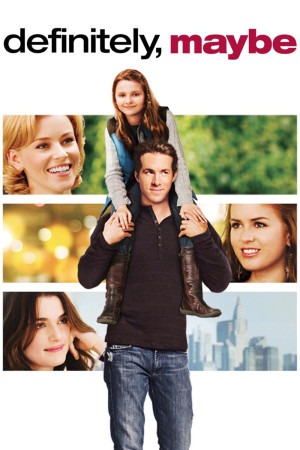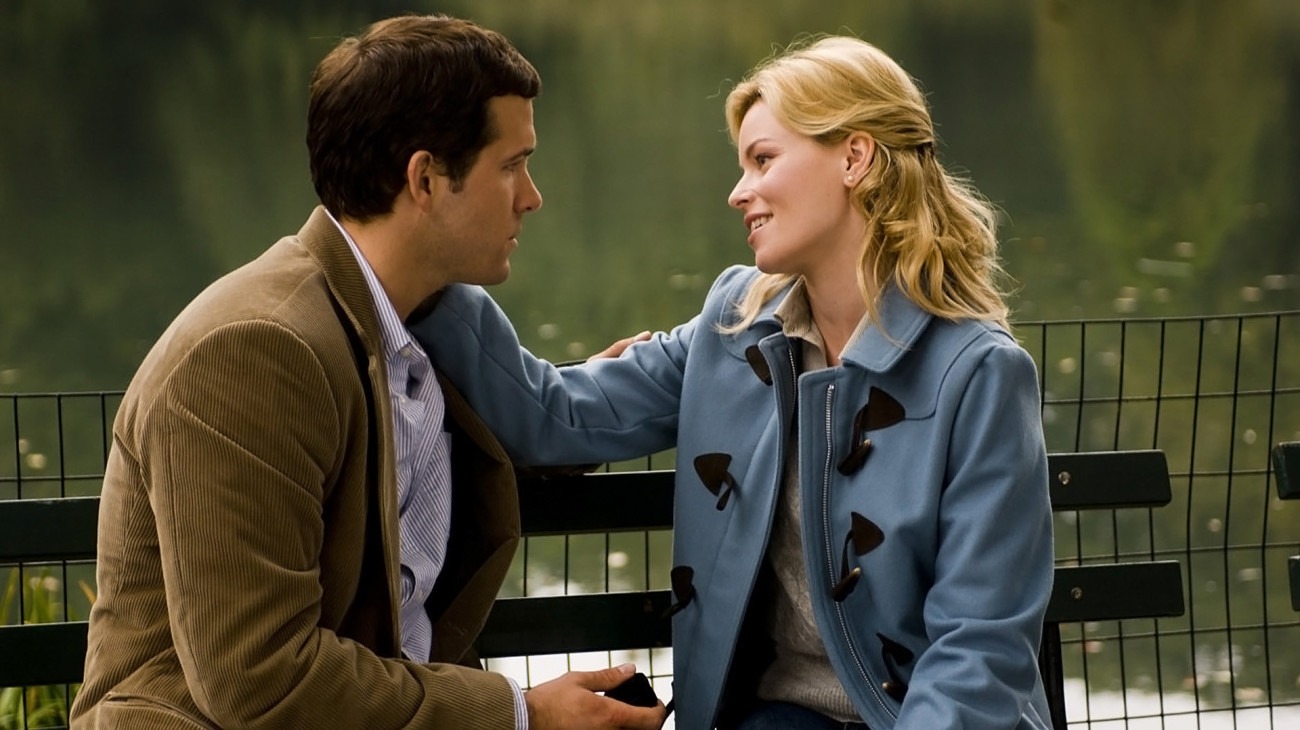
Maybe not
You know what you're getting into pretty much the instant that Definitely, Maybe begins: William Hayes (Ryan Reynolds) voiceovers that one of his perpetual goals in life is to find the perfect song to score every moment of every day, and that on this Tuesday - he loves Tuesdays, they're the day he gets to spend with his daughter - he has a perfect song. In go the tiny wireless earbuds, on goes the shiny generic iPod, out comes a rap song prominently featuring the word "bitch." This is what I like to call a "ho ho!" moment: it is so self-satisfied with the blustering quip just made that the thin humor that remains once the obvious has all been scraped away is completely scrapped, and I think of the film as a rotund Dickensian gentlemen chortling "ho HO!" at himself, while I-the-audience am cast as the valet hoping he won't notice that I didn't laugh.
ANYWAY, the point I was making is that after his little whoops moment, Will sheepishly informs us, still in voiceover, that here's the actual perfect song for the perfect day, and the film's soundtrack is taken over by "Everyday People" by Sly & the Family Stone. Way to dig through the album cuts there, Mr. Hayes!
So yeah, the point of that digressive bloviating is that this film opens with its main character bragging about his clever song-picking skills, and to prove it he foists upon the audience one of the most overplayed songs on the face of the planet. Thus will be the dominant key of Definitely, Maybe; the film keeps threatening to get smart on your ass, before retreating to the safest corners with the fewest sharp edges that it can find in the romcom playbook.
The film is not, at any rate, guilty of that greatest sin of the modern romantic movie: it does not tell lies about "happily ever after." At the start of the film, Will opens an envelope containing divorce papers; as the film unspools he will share with his daughter Maya (Abigail Breslin) an autobiographical tale meant to reveal both why we're all perpetually alone and why we keep playing the game anyway. It's actually a bit like an ersatz Annie Hall written by a man with barely a trace of Woody Allen and Marshall Brickman's natural intelligence and starring a man who is frankly not a whole lot more charismatic than Allen.
Definitely, Maybe - I confess that I hate the title a little bit less every time I type it, although that comma needs to go right back to hell, all the more so since the opening credits animation seems carefully designed to call the most possible attention to it - begins in earnest once Will picks Maya up after school that fated Tuesday to find a small riot breaking out over the fact that the 5th or 6th graders have been given their first sex-ed class (that "or" is because we're never told - Maya is 11 years old, which could be either, but can there really be that much controversy over teaching 6th graders in New York City sex-ed?). This gives the movie one of its funniest grace notes, a girl unable to cope with the thought of her parents having sex, and one of its most queasily unpleasant riffs, as Breslin says "penis" what must be two-dozen times. Long story short, Will is forced to explain what love and sex really are, and he uses his own newly-failed marriage as the base of his argument. Answering Maya's longstanding question about how her parents met, Will presents this story as a mystery of sorts, telling her about the three great loves of his life without telling her which one he ultimately married.
That framework drifts in and out of the movie for the next 80 minutes, which largely consists of a big flashback to the glorious years of 1992 through 1997, and the one element of Definitely, Maybe that pissed me off more than anything else: it doesn't look like 1992 through 1997. There are "remember when?" type gags like the giant "cellular phone" that Will has to hold, or the hipster who name-drops Kurt Cobain (ah! those days before Pitchfork rounded all the indie music snobs into one conveniently-ignorable place!). By far the most obvious and weirdest element of the flashback is that Will was an ardent member of the Clinton campaign staff, and the rises and falls in that man's career neatly (too neatly) mirror Will's erratic love life. But the clothes and hair are all perfectly modern (and Ryan Reynolds hasn't even been made up to look like 16 years have passed - the frame story takes place in September, 2008, which means that this is a science fiction movie), and it just feels very modern but caught in period dress. Not that the period is so remote as all that.
Will's story revolves around three women: Emily (Elizabeth Banks), the Midwestern girl/college sweetheart; Summer (Rachel Weisz), the smart, urbane anti-romantic; and April (Isla Fisher), the darling quirky one. It probably counts as a point in the film's favor that although the film telegraphs which woman is just right, the divorce plotline muddies things up a bit and the way the film reaches its ultimate conclusion (which is much more routine chick-flickery and much less "We need the eggs") is honestly pretty hard to predict.
I mean, it's not like Adam Brooks, the writer and director, didn't try. He plainly wanted to make a thoughtful - but cheery! - film about the pitfalls of love in the modern world, with its high failure rate and the weird tension of a culture that privileges both hooking up and companionship. Unfortunately, that's not the sort of movie that gets made, especially not with people like Ryan Reynolds and Isla Fisher, neither of whom have ever been better but "Ryan Reynolds's high water-mark" isn't exactly praise.
The end product is sweet, charming (thanks mostly to the endlessly reliable Breslin), and not particularly funny for even a moment. It is almost completely without personality, and the only thing that makes it even slightly memorable is its willingness to admit that there are sad things in life like divorce and loneliness, even if it doesn't make a real effort to follow through on that realisation.
6/10
ANYWAY, the point I was making is that after his little whoops moment, Will sheepishly informs us, still in voiceover, that here's the actual perfect song for the perfect day, and the film's soundtrack is taken over by "Everyday People" by Sly & the Family Stone. Way to dig through the album cuts there, Mr. Hayes!
So yeah, the point of that digressive bloviating is that this film opens with its main character bragging about his clever song-picking skills, and to prove it he foists upon the audience one of the most overplayed songs on the face of the planet. Thus will be the dominant key of Definitely, Maybe; the film keeps threatening to get smart on your ass, before retreating to the safest corners with the fewest sharp edges that it can find in the romcom playbook.
The film is not, at any rate, guilty of that greatest sin of the modern romantic movie: it does not tell lies about "happily ever after." At the start of the film, Will opens an envelope containing divorce papers; as the film unspools he will share with his daughter Maya (Abigail Breslin) an autobiographical tale meant to reveal both why we're all perpetually alone and why we keep playing the game anyway. It's actually a bit like an ersatz Annie Hall written by a man with barely a trace of Woody Allen and Marshall Brickman's natural intelligence and starring a man who is frankly not a whole lot more charismatic than Allen.
Definitely, Maybe - I confess that I hate the title a little bit less every time I type it, although that comma needs to go right back to hell, all the more so since the opening credits animation seems carefully designed to call the most possible attention to it - begins in earnest once Will picks Maya up after school that fated Tuesday to find a small riot breaking out over the fact that the 5th or 6th graders have been given their first sex-ed class (that "or" is because we're never told - Maya is 11 years old, which could be either, but can there really be that much controversy over teaching 6th graders in New York City sex-ed?). This gives the movie one of its funniest grace notes, a girl unable to cope with the thought of her parents having sex, and one of its most queasily unpleasant riffs, as Breslin says "penis" what must be two-dozen times. Long story short, Will is forced to explain what love and sex really are, and he uses his own newly-failed marriage as the base of his argument. Answering Maya's longstanding question about how her parents met, Will presents this story as a mystery of sorts, telling her about the three great loves of his life without telling her which one he ultimately married.
That framework drifts in and out of the movie for the next 80 minutes, which largely consists of a big flashback to the glorious years of 1992 through 1997, and the one element of Definitely, Maybe that pissed me off more than anything else: it doesn't look like 1992 through 1997. There are "remember when?" type gags like the giant "cellular phone" that Will has to hold, or the hipster who name-drops Kurt Cobain (ah! those days before Pitchfork rounded all the indie music snobs into one conveniently-ignorable place!). By far the most obvious and weirdest element of the flashback is that Will was an ardent member of the Clinton campaign staff, and the rises and falls in that man's career neatly (too neatly) mirror Will's erratic love life. But the clothes and hair are all perfectly modern (and Ryan Reynolds hasn't even been made up to look like 16 years have passed - the frame story takes place in September, 2008, which means that this is a science fiction movie), and it just feels very modern but caught in period dress. Not that the period is so remote as all that.
Will's story revolves around three women: Emily (Elizabeth Banks), the Midwestern girl/college sweetheart; Summer (Rachel Weisz), the smart, urbane anti-romantic; and April (Isla Fisher), the darling quirky one. It probably counts as a point in the film's favor that although the film telegraphs which woman is just right, the divorce plotline muddies things up a bit and the way the film reaches its ultimate conclusion (which is much more routine chick-flickery and much less "We need the eggs") is honestly pretty hard to predict.
I mean, it's not like Adam Brooks, the writer and director, didn't try. He plainly wanted to make a thoughtful - but cheery! - film about the pitfalls of love in the modern world, with its high failure rate and the weird tension of a culture that privileges both hooking up and companionship. Unfortunately, that's not the sort of movie that gets made, especially not with people like Ryan Reynolds and Isla Fisher, neither of whom have ever been better but "Ryan Reynolds's high water-mark" isn't exactly praise.
The end product is sweet, charming (thanks mostly to the endlessly reliable Breslin), and not particularly funny for even a moment. It is almost completely without personality, and the only thing that makes it even slightly memorable is its willingness to admit that there are sad things in life like divorce and loneliness, even if it doesn't make a real effort to follow through on that realisation.
6/10
Categories: comedies, joyless mediocrity, love stories, romcoms






